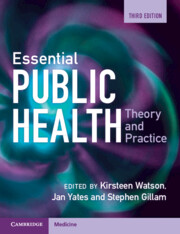Introduction
Published online by Cambridge University Press: 01 December 2023
Summary
Public health cannot be understood or fully appreciated without some knowledge of its history, which this Introduction provides. Conventionally, this begins with the large body of work associated with Hippocrates (c. 460–370 BC). In these writings, health was viewed as resulting from a sound balance of the humours. Therapy included diet, exercise and other interventions tailored to the individual – akin to today’s emphasis on healthy living and lifestyle. The Hippocratics were, in addition, early exponents of environmentalism. In Airs, Waters, Places, the occurrence of disease was linked to such factors as climate, soil and water quality. Proposals for disease prevention were related to specific social and economic circumstances.
- Type
- Chapter
- Information
- Essential Public HealthTheory and Practice, pp. 1 - 10Publisher: Cambridge University PressPrint publication year: 2023

